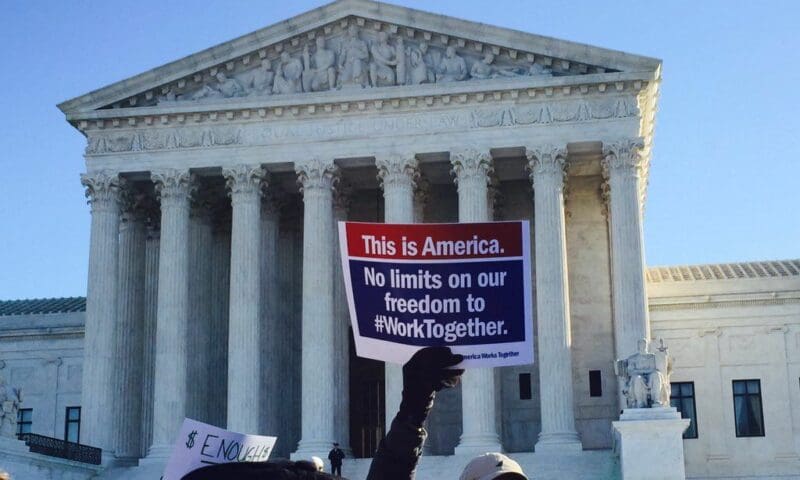

Flint was a failure of government — but it didn’t have to be so. And government wasn’t the root of the problem. It was about the people, and ideas they advocate, who have taken control of governments across the country.
Water is a public good provided by public institutions — i.e. governments. It should be clear now that “running government like a business” (the privatizers trope) means you don’t invest in places that don’t have markets that can afford to buy your products. It didn’t work for Flint and it doesn’t work for America. Government needs to be run like a government — clear about its mission, run by competent people (yes, bureaucrats) committed passionately to the public good.
The tragedy of Flint should never have happened, but at this point, the evidence is undeniable and the suffering is real. Fixing Flint is an urgent priority.


Robert Reich stepped down from his post as Labor Secretary in 1996 to spend more time with his teenage sons, Adam, now a sociology professor at Columbia University, and Sam, a writer and director who heads the video department at the popular comedy site CollegeHumor.com. (Reich and Clare Dalton divorced in 2012; he has since remarried.) Resuming the academic career he had embarked on in 1980 as a professor at Harvard’s John F. Kennedy School of Government, he took a position at Brandeis University and published a well-received serio-comic memoir about his years in the Clinton administration, Locked in the Cabinet.
Other than an unsuccessful run for governor of Massachusetts in 2002, he has spent most of the past two decades as a de facto Economic Educator in Chief for millions of Americans. Reich, who co-founded the American Prospect magazine,


It’s two weeks before Thanksgiving, and a crowd of 500 people has filled the Silicon Valley Commonwealth Club to hear former U.S. Labor Secretary Robert Reich discuss a decidedly less than festive topic: How the economy is leaving most Americans behind. The subject, which inspired Reich’s latest book, Saving Capitalism, hits particularly close to home here, where uber-rich tech titans coexist with legions of low-wage workers, even as the middle class is increasingly squeezed out of nearby communities like Redwood City and Milpitas by ever-rising housing prices.
But Reich has no intention of bludgeoning his audience with bleak statistics and grim predictions. “As you can see, the economy has worn me down,” says the 4-foot-11-inch Reich, pausing as laughter spreads across the room. “Really, before the Great Recession I was, you know, 6 foot 2.”
Moments earlier,


 Last Monday was an important day for America’s shrinking middle class. The Supreme Court heard oral arguments in Friedrichs v. California Teachers Association, a case that could impose radical new limits on the rights of public-sector workers—like teachers, nurses and firefighters—to join together to win better lives for their families and communities.
Last Monday was an important day for America’s shrinking middle class. The Supreme Court heard oral arguments in Friedrichs v. California Teachers Association, a case that could impose radical new limits on the rights of public-sector workers—like teachers, nurses and firefighters—to join together to win better lives for their families and communities.
What’s at stake is a basic democratic principle: All public workers that benefit from collective bargaining should be required to pay their fair share for those efforts.
So it’s no surprise that the Friedrichs lawsuit was filed by the Center for Individual Rights, a law firm with ties to anti-worker special interests—like the Koch brothers and ALEC.
These are the same interests that have spent decades campaigning to weaken the ability of working people to join together against corporate power and the interests of the One Percent.


 As we celebrate his birthday, it is easy to forget that Rev. Martin Luther King Jr. was a democratic socialist.
As we celebrate his birthday, it is easy to forget that Rev. Martin Luther King Jr. was a democratic socialist.
In 1964, accepting the Nobel Peace Prize in Oslo, he observed that the United States could learn much from Scandinavian “democratic socialism.” He often talked about the need to confront “class issues,” which he described as “the gulf between the haves and the have-nots.”
In 1966 King confided to his staff:
“You can’t talk about solving the economic problem of the Negro without talking about billions of dollars. You can’t talk about ending the slums without first saying profit must be taken out of slums. You’re really tampering and getting on dangerous ground because you are messing with folk then. You are messing with captains of industry. Now this means that we are treading in difficult water, because it really means that we are saying that something is wrong with capitalism.
» Read more about: Martin Luther King Jr. on the Haves and Have-nots »


As this country hurtles into a New Year, I am grateful for the stop sign at Martin Luther King Jr.’s national holiday. It offers time for me to consider again the meaning of my life as well as to our national purpose. This year I am remembering that King’s life focused not only on civil rights, but also jobs. His vision of justice went beyond voting and equality to decent work for livable pay. That’s why he went to Memphis – to support striking garbage workers.
I am old enough to remember the early days of the peace conversion movement in the 1970s. Following the end of the war in Vietnam many people thought that the savings no longer needed for the military in that misadventure could be turned into social investments such as hospitals, schools and such, bringing good jobs with them. Again, at the end of the Cold War,
» Read more about: Peace and Jobs: A Conversion Conversation »


Juan and Manuel Salvador Orozco Cadena, a pair of fishermen from Baja California, Mexico, pushed off from Punta Lobos on the morning of November 4, 2015. Earlier, the Orozcos had repaired the transmission of their outboard motor, but then it broke down again. As night closed in, the brothers floated helplessly in their open panga 30 miles off the Pacific Coast, making intermittent contact by cellphone, before being rescued by the Mexican coast guard.
At the same moment the Orozcos had first pushed off into the sea, Airbnb executives 1,200 miles away were celebrating the defeat of a San Francisco ballot initiative aimed at regulating the short-stay rental titan. What could possibly be the connection between two Mexican fishermen adrift in the ocean and a company valued by Wall Street estimates at $25.5 billion?
The answer is Chip Conley, a good-looking, 55 year-old fit guy with a shaved head and a charismatic smile whose official full-time job is Head of Global Hospitality for Airbnb.
» Read more about: Ambassador Recalled: Airbnb’s Chip Conley’s Mexican Misadventure »


On Monday the Supreme Court heard oral arguments in Friedrichs v. California Teachers Association, a lawsuit that targets Abood v. Detroit Board of Education, a nearly 40-year cornerstone of labor-management relations. At stake is the principle that, although public employees who don’t join a union cannot be required to pay for the union’s political activities, they can be charged an “agency” or “fair share” fee to pay for the services that the union is required by law to provide all members.
Capital & Main asked labor attorney and Century Foundation fellow Moshe Marvit, who studied Monday’s transcripts, for his assessment of the case, whose ruling is expected by June.
Capital & Main: Were there any surprises in Monday’s arguments?
Moshe Marvit: There had been some hope that [Justice Antonin] Scalia might be a little bit more open to California’s and the union’s arguments,
» Read more about: Moshe Marvit’s Six “Friedrichs” Takeaways »


Friedrichs v. California Teachers Association, the latest struggle over workers’ rights, a case whose oral arguments were heard Monday by the U.S. Supreme Court, clearly means different things to different groups. The passionate rhetoric around Friedrichs, and most of its proponents’ legal arguments, have focused on individual liberties and freedom of speech. “Paying fees to a union should not be a prerequisite for teaching in a public school,” Harlan Elrich, one of the plaintiffs, wrote in the Wall Street Journal. “No one in the U.S. should be forced to give money to a private organization he or she disagrees with fundamentally.”
But the main goal of those funding the case is, likely, to reshape the political landscape by neutralizing the power of organized labor. The broad impact of a successful suit will be to drain the union of dues,


Read transcript of today’s Supreme Court oral arguments in Friedrichs v. CTA
Last July, 2,000 conservatives and Tea Party activists gathered in Las Vegas for the annual FreedomFest, which featured GOP presidential frontrunners Donald Trump and Marco Rubio. But it was a fourth grade public school teacher from Orange County named Rebecca Friedrichs who promised the far right a prize that neither Trump nor Rubio could offer. Friedrichs and nine other California school teachers are part of a lawsuit now before the U.S. Supreme Court that could deliver a severe blow to the nation’s public-sector unions. It would radically upend the political power of labor — and also, conservatives hope, of the Democratic Party — across the United States.
Friedrichs’ message last summer was the same as she has told audiences elsewhere: “Supposed [union] benefits are not worth the moral costs.”
The “moral dilemma,” she claims,
» Read more about: Could Friedrichs v. CTA Be Labor’s ‘Citizens United’? »